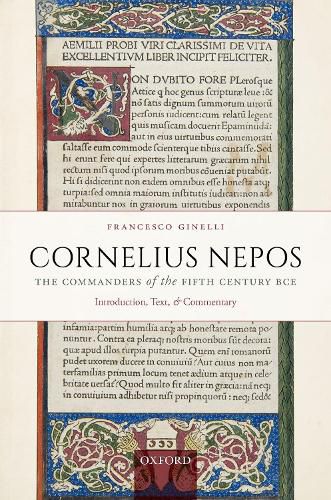Readings Newsletter
Become a Readings Member to make your shopping experience even easier.
Sign in or sign up for free!
You’re not far away from qualifying for FREE standard shipping within Australia
You’ve qualified for FREE standard shipping within Australia
The cart is loading…






Cornelius Nepos’ De viris illustribus was a collection of biographies of distinguished Romans and foreigners, originally arranged in at least sixteen books, of which only the Liber de excellentibus ducibus exterarum gentium has survived. In this volume, Francesco Ginelli provides a philological, stylistic, grammatical, and historical commentary on the first eight Vitae of the Liber, comprising Miltiades, Themistocles, Aristides, Pausanias, Cimon, Lysander, Alcibiades, and Thrasybulus, all eminent generals of the fifth century BCE. Ginelli also provides a substantial introduction, giving an overview of Nepos’ life, the key features of his works, and the manuscript tradition of the De viris illustribus. As the first academic commentary on Nepos’ biographies of the Greek commanders of the fifth century BCE, this book will fill a gap in Latin studies, providing a useful tool for both students and scholars interested in Nepos, as well as those interested in ancient biography and Latin historiography more generally.
$9.00 standard shipping within Australia
FREE standard shipping within Australia for orders over $100.00
Express & International shipping calculated at checkout
Cornelius Nepos’ De viris illustribus was a collection of biographies of distinguished Romans and foreigners, originally arranged in at least sixteen books, of which only the Liber de excellentibus ducibus exterarum gentium has survived. In this volume, Francesco Ginelli provides a philological, stylistic, grammatical, and historical commentary on the first eight Vitae of the Liber, comprising Miltiades, Themistocles, Aristides, Pausanias, Cimon, Lysander, Alcibiades, and Thrasybulus, all eminent generals of the fifth century BCE. Ginelli also provides a substantial introduction, giving an overview of Nepos’ life, the key features of his works, and the manuscript tradition of the De viris illustribus. As the first academic commentary on Nepos’ biographies of the Greek commanders of the fifth century BCE, this book will fill a gap in Latin studies, providing a useful tool for both students and scholars interested in Nepos, as well as those interested in ancient biography and Latin historiography more generally.